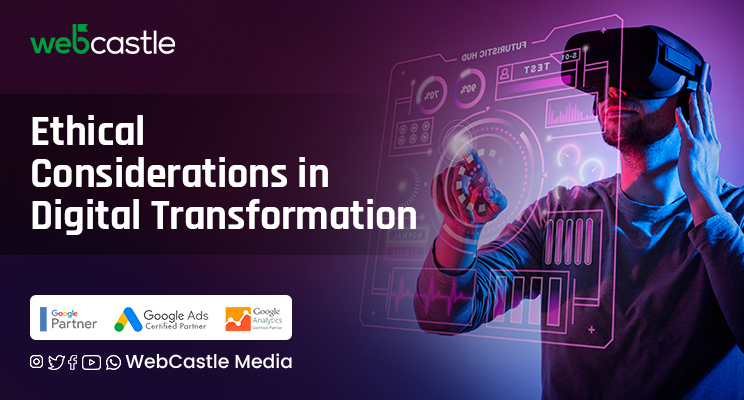
In an era of rapid technological advancements, digital transformation has become a buzzword across industries. Organizations are embracing digital technologies to streamline operations, enhance customer experiences, and gain a competitive edge. However, amidst this digital revolution, ethical considerations often take a back seat. In this blog post, we’ll explore the critical ethical considerations that should be at the forefront of any digital transformation journey.
Before diving into the ethical aspects, let’s briefly clarify what digital transformation entails.The act of harnessing digital technologies to fundamentally change how a company runs and delivers value to its customers is known as digital transformation.
It involves integrating digital solutions into various aspects of a business, from processes and operations to customer interactions and product offerings.
Digital transformation offers immense opportunities, but it also raises ethical concerns that need to be addressed. As organizations harness data, automation, artificial intelligence, and other digital tools, they must do so responsibly and ethically. Here are the key ethical considerations in digital transformation
1. Data Privacy and Security
The collection, storage, and use of data are central to digital transformation. Organizations must prioritize the privacy and security of customer and employee data. This includes obtaining informed consent, implementing robust cybersecurity measures, and ensuring data is used only for its intended purposes. Violating data privacy can result in severe legal and reputational consequences.
2.Transparency and Accountability
Transparency is essential when implementing digital technologies. Organizations should clearly communicate how data is collected and used. They must also be accountable for the consequences of their digital actions. This includes taking responsibility for algorithmic decisions made by artificial intelligence systems and providing avenues for recourse in case of errors or bias.
3.Bias and Fairness
Digital transformation often involves the use of AI and machine learning algorithms. These algorithms can inadvertently perpetuate bias if not designed and trained carefully. Ethical considerations require organizations to address bias in AI systems and ensure fairness in decision-making processes. Regular audits and bias-mitigation strategies are essential
4.Employee Rights and Well-being
Automation and digitalization can lead to workforce disruptions. Organizations must consider the ethical implications of job displacement and take measures to upskill or retrain employees affected by digital transformation. Additionally, they should prioritize employee well-being, addressing issues like remote work burnout and data privacy for remote workers.
5.Environmental Impact
Digital transformation can have a substantial environmental footprint, particularly through data centers and increased energy consumption. Organizations should adopt eco-friendly practices and invest in sustainable technologies. Ethical considerations extend to minimizing electronic waste and reducing the carbon footprint of digital operations.
Addressing ethical considerations in digital transformation is not a one-time task; it’s an ongoing commitment. Here’s how businesses can overcome these obstacles:
1.Develop Ethical Guidelines
Organizations should establish clear ethical guidelines that govern the use of digital technologies. These guidelines should be communicated throughout the organization and integrated into decision-making processes.
2.Foster Ethical Leadership
Setting the tone at the top requires ethical leadership.Leaders should exemplify ethical behavior and champion responsible digital practices. Training and development programs can help cultivate ethical leadership skills.
3.Collaborate with Ethical Tech Partners
When selecting technology partners, consider their commitment to ethics. Collaborate with vendors and suppliers who share your ethical values and prioritize responsible tech solutions.
4.Conduct Ethical Impact Assessments
Before implementing new digital technologies, conduct ethical impact assessments to identify potential risks and ethical challenges. This proactive approach allows organizations to mitigate issues in advance.
5.Seek External Audits
Engage external auditors or ethical experts to evaluate your digital transformation initiatives. Independent assessments can provide valuable insights and ensure impartiality in addressing ethical concerns.
Also Read:Key Trends in Digital Transformation and Navigating Digital Disruption
Digital transformation is reshaping industries and driving innovation at an unprecedented pace. However, organizations must not overlook the ethical considerations that come with this transformation. Prioritizing data privacy, transparency, fairness, employee well-being, and environmental impact is not only a moral imperative but also essential for building trust with customers, employees, and stakeholders.

Call
